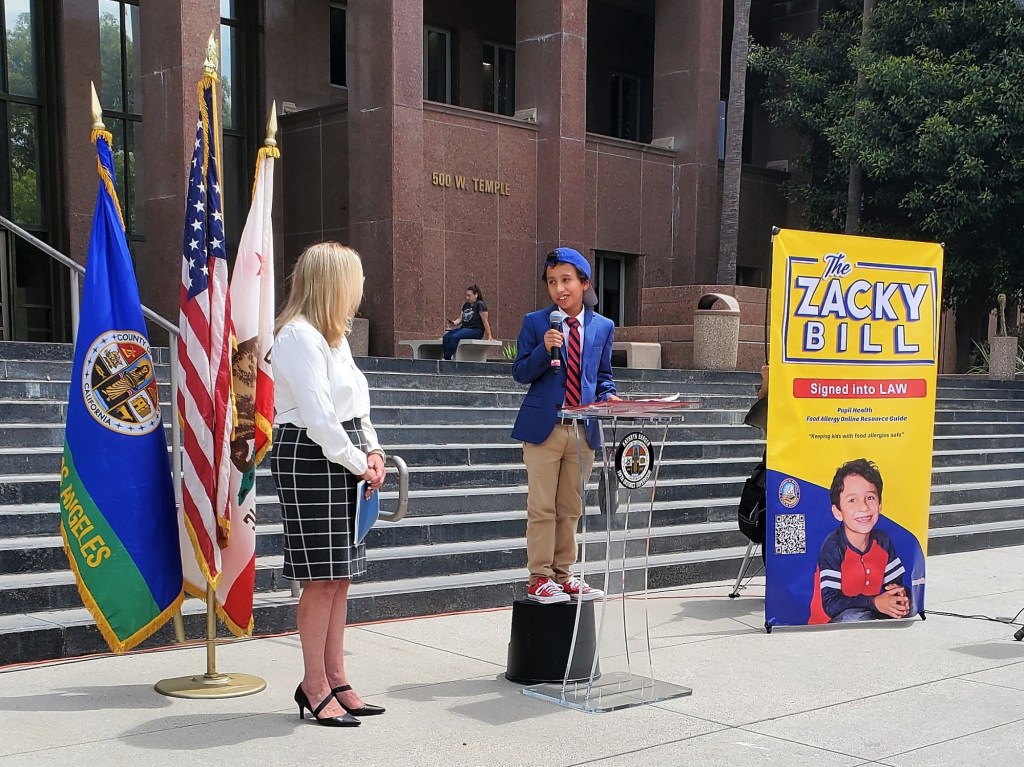When he returns to school next week, Zacky Muñoz of Pasadena can write an impressive essay on what he did during his summer vacation.
“You’re 11 and you got a bill passed, that’s a big deal and you did all the work,” said Los Angeles County Supervisor Kathryn Barger, whose district includes the youngster’s hometown. “I’m so proud of your commitment to creating a better future for students.”
Zacky’s Bill, or Assembly Bill 2640, requires the California Department of Education to make the California Food Allergy Resource Guide available to all school districts. The online guide distills information on state and federal guidelines, lists contact information for resources and helps affected families learn how to initiate strategies in schools to minimize risk. Barger introduced a motion in 2022, putting the Board’s support behind the bill in the state Legislature. Gov. Gavin Newsom signed it into law in January.
The Pasadena sixth-grader was honored in a ceremony at the Hahn Hall of Administration in Los Angeles on Wednesday. Zacky said the hardest part of getting legislation passed was getting the word out.
“I feel so alive because I am advocating for something important,” he said.
Zacky was in first grade when he had two anaphylactic reactions at school: once when he ate a breadstick sprinkled with sesame seeds and another time when the usual allergen-free croutons in his salad were inadvertently switched to one with nuts. Zacky broke out in hives, started coughing and vomiting and felt his throat closing. School staff administered epinephrine pens.

The two episodes spurred his mother, Priscilla Hernandez, to work on a guide that would help school administrators, nurses, staff as well as families navigate the daily calculations, options and protections available to school children with food allergies.
Mother and son started working on the guide at their kitchen table. The message: Don’t panic, get informed then get involved.
“We knew we needed to get the word out, the importance of reading food labels and controlling what we eat, looking at our lifestyle differently,” Hernandez said.
They joined FARE, the nonprofit Food Allergy Research and Education, which reports the new bill will help the 460,000 students with school allergies in the state’s K-12 schools. About 6 million children nationwide have food allergies, according to Jaime Rupert, the nonprofit’s communications officer.
Hernandez said her son suffered from eczema since birth. Once he was diagnosed with allergies to nuts, sesame seeds, shellfish, legumes and avocados, Zacky learned to be proactive.
“I’ve been so blessed to use my voice to represent the many students with food allergies, especially those who can no longer use their voice,” he said.
He wears red Converse shoes to honor Oakley Debbs, an 11-year-old who died in 2016 after eating a slice of cake with walnuts. A fan of the Dodgers, dinosaurs and Spiderman, Zacky said he wants to be president of the United States when he grows up.
“We’re so proud of him,” said his father and namesake, Zachary Muñoz. “He’s taken something really challenging and turned it into something positive.”
The family is working on another bill, AB 1651, or the Muñoz SAFE Act, which stands for Student Allergy Framework for Emergencies. It will amend the state education code to ensure epi pens are not locked up and that school staff are trained in their use.
“Having a food allergy makes you different, but being different is not a bad thing,” Zacky said. “Being different is my superpower and I know I can use that power to help change the world.”
𝗖𝗿𝗲𝗱𝗶𝘁𝘀, 𝗖𝗼𝗽𝘆𝗿𝗶𝗴𝗵𝘁 & 𝗖𝗼𝘂𝗿𝘁𝗲𝘀𝘆: www.mercurynews.com
𝗙𝗼𝗿 𝗮𝗻𝘆 𝗰𝗼𝗺𝗽𝗹𝗮𝗶𝗻𝘁𝘀 𝗿𝗲𝗴𝗮𝗿𝗱𝗶𝗻𝗴 𝗗𝗠𝗖𝗔,
𝗣𝗹𝗲𝗮𝘀𝗲 𝘀𝗲𝗻𝗱 𝘂𝘀 𝗮𝗻 𝗲𝗺𝗮𝗶𝗹 𝗮𝘁 [email protected]


